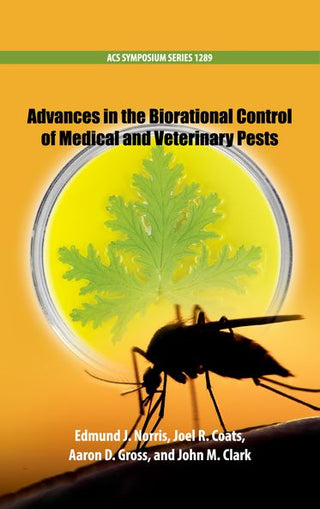Advances in the Biorational Control of Medical and Veterinary Pests
- Unit price
- / per
-
Author:NORRIS Edmund / COATS Joe / GROSS Aaron
-
ISBN:9780841233591
-
Publication Date:September 2019
-
Edition:1
-
Pages:304
-
Binding:Hardback
-
Publisher:Oxford University Press
-
Country of Publication:United Kingdom


A Back Order button means that we don’t have the book in stock at our store. It may already be on order – or we can order it for you from a publisher or distributor at no additional cost.
As we source items from around the globe, a back-order can take anywhere from 5 days to several weeks to arrive, depending on the title.
To check how long this might take, you’re welcome to contact us and we can provide an ETA or any other information you need. We recommend checking the timeframe before committing to an online order.
Advances in the Biorational Control of Medical and Veterinary Pests
- Unit price
- / per
-
Author:NORRIS Edmund / COATS Joe / GROSS Aaron
-
ISBN:9780841233591
-
Publication Date:September 2019
-
Edition:1
-
Pages:304
-
Binding:Hardback
-
Publisher:Oxford University Press
-
Country of Publication:United Kingdom
Description
Insect vectors pose a significant threat to public health and veterinary medicine throughout the world. It is estimated that more than 700,000 people die annually from complications associated with mosquito-borne disease alone, without accounting for the impact caused by other arthropod pests of public health importance. As these pest insect populations become increasingly resistant to classical synthetic insecticides, new chemistries and control approaches need to be rapidly developed, characterized, and deployed. Biorational control methods are technologies derived from natural chemistry or exploit the physiology of the arthropod pest in question to limit potential harm to non-target organisms. As the global population grows and continues to encounter new and old arthropod-borne diseases, it is paramount that future arthropod control technologies are safe and sustainable to our communities and the environment around us.
Adding product to your cart
You may also like
A Back Order button means that we don’t have the book in stock at our store. It may already be on order – or we can order it for you from a publisher or distributor at no additional cost.
As we source items from around the globe, a back-order can take anywhere from 5 days to several weeks to arrive, depending on the title.
To check how long this might take, you’re welcome to contact us and we can provide an ETA or any other information you need. We recommend checking the timeframe before committing to an online order.
You may also like
You may also like
-
Insect vectors pose a significant threat to public health and veterinary medicine throughout the world. It is estimated that more than 700,000 people die annually from complications associated with mosquito-borne disease alone, without accounting for the impact caused by other arthropod pests of public health importance. As these pest insect populations become increasingly resistant to classical synthetic insecticides, new chemistries and control approaches need to be rapidly developed, characterized, and deployed. Biorational control methods are technologies derived from natural chemistry or exploit the physiology of the arthropod pest in question to limit potential harm to non-target organisms. As the global population grows and continues to encounter new and old arthropod-borne diseases, it is paramount that future arthropod control technologies are safe and sustainable to our communities and the environment around us.
-
-
Author: NORRIS Edmund / COATS Joe / GROSS AaronISBN: 9780841233591Publication Date: September 2019Edition: 1Pages: 304Binding: HardbackPublisher: Oxford University PressCountry of Publication: United Kingdom
Insect vectors pose a significant threat to public health and veterinary medicine throughout the world. It is estimated that more than 700,000 people die annually from complications associated with mosquito-borne disease alone, without accounting for the impact caused by other arthropod pests of public health importance. As these pest insect populations become increasingly resistant to classical synthetic insecticides, new chemistries and control approaches need to be rapidly developed, characterized, and deployed. Biorational control methods are technologies derived from natural chemistry or exploit the physiology of the arthropod pest in question to limit potential harm to non-target organisms. As the global population grows and continues to encounter new and old arthropod-borne diseases, it is paramount that future arthropod control technologies are safe and sustainable to our communities and the environment around us.
-
Author: NORRIS Edmund / COATS Joe / GROSS AaronISBN: 9780841233591Publication Date: September 2019Edition: 1Pages: 304Binding: HardbackPublisher: Oxford University PressCountry of Publication: United Kingdom
-



